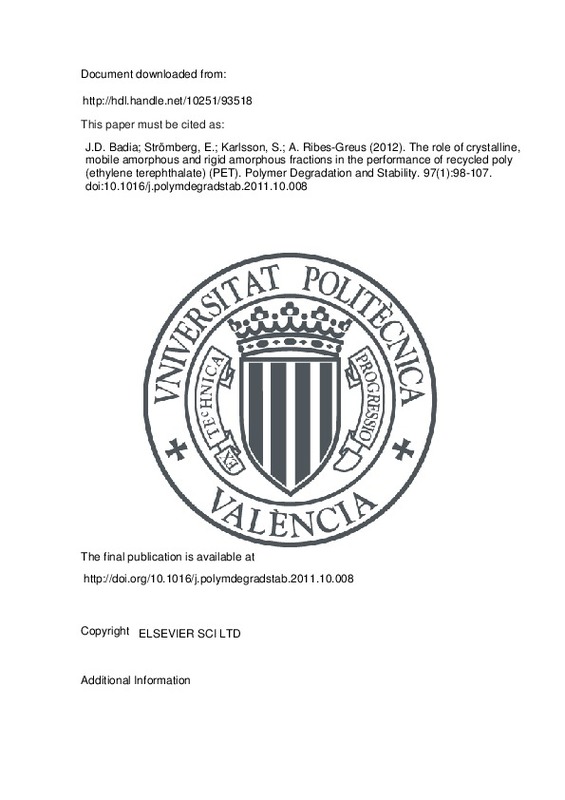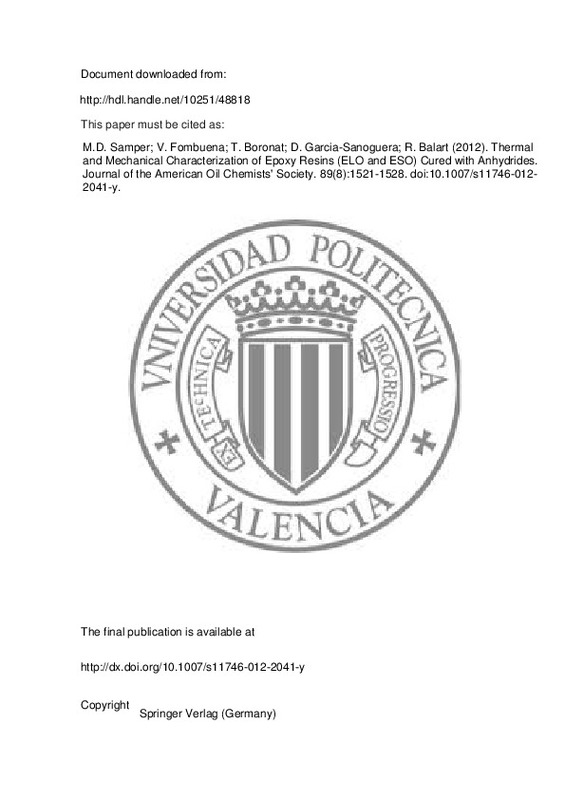JavaScript is disabled for your browser. Some features of this site may not work without it.
Buscar en RiuNet
Listar
Mi cuenta
Estadísticas
Ayuda RiuNet
Admin. UPV
The role of crystalline, mobile amorphous and rigid amorphous fractions in the performance of recycled poly (ethylene terephthalate) (PET)
Mostrar el registro sencillo del ítem
Ficheros en el ítem
| dc.contributor.author | Badia, J.D.
|
es_ES |
| dc.contributor.author | Strömberg, Emma
|
es_ES |
| dc.contributor.author | Karlsson, Sigbritt
|
es_ES |
| dc.contributor.author | Ribes-Greus, A.
|
es_ES |
| dc.date.accessioned | 2017-12-28T11:35:40Z | |
| dc.date.available | 2017-12-28T11:35:40Z | |
| dc.date.issued | 2012 | es_ES |
| dc.identifier.issn | 0141-3910 | es_ES |
| dc.identifier.uri | http://hdl.handle.net/10251/93518 | |
| dc.description.abstract | [EN] The action of thermo-mechanical degradation induced by mechanical recycling of poly(ethylene terephthalate) was simulated by successive injection moulding cycles. Degradation reactions provoked chain scissions and a reduction in molar mass mainly driven by the reduction of diethyleneglycol to ethylene glycol units in the flexible domain of the PET backbone, and the formation of -OH terminated species with shorter chain length. The consequent microstructural changes were quantified taking into account a three-fraction model involving crystalline, mobile amorphous (MAF) and rigid amorphous fractions (RAF). A remarkable increase of RAF, to a detriment of MAF was observed, while the percentage of crystalline fraction remained nearly constant. A deeper analysis of the melting behaviour, the segmental dynamics around the glass-rubber relaxation, and the macroscopic mechanical performance, showed the role of each fraction leading to a loss of thermal, viscoelastic and mechanical features, particularly remarkable after the first processing cycle. © 2011 Elsevier Ltd. All rights reserved. | es_ES |
| dc.description.sponsorship | The authors would like to acknowledge the Spanish Ministry of Science and Innovation for the financial support through the Research Project UPOVCE-3E-013 and for the funding of a pre-doctoral research position to J.D. Badía by means of the FPU program conceded by the Spanish Ministry for Education. Catalana de Polimers, S.A. and AIMPLAS are acknowledged for providing and processing the material, respectively. Mr. Peter Kaali is thanked for carrying out impact tests and Mrs. Sevil Atari Jabarzadeh for helping with SEM analysis. The authors thank the financial support of the Generalitat Valenciana through the ACOMP/2011/189 and the Gerónimo Forteza grant to J.D. Badía. Universitat Politècnica de València (UPV, Spain) is thanked for additional support through the PAID 05-09-4331 program and Royal Institute of Technology (KTH, Sweden) is thanked for additional economical support. | |
| dc.language | Inglés | es_ES |
| dc.publisher | ELSEVIER SCI LTD | es_ES |
| dc.relation.ispartof | Polymer Degradation and Stability | es_ES |
| dc.rights | Reconocimiento - No comercial - Sin obra derivada (by-nc-nd) | es_ES |
| dc.subject | Differential scanning calorimetry (DSC) | es_ES |
| dc.subject | Infrared analysis (FT-IR) | es_ES |
| dc.subject | Mechanical properties | es_ES |
| dc.subject | Mechanical recycling | es_ES |
| dc.subject | Poly(ethylene terephthalate) (PET) | es_ES |
| dc.subject | Chain scission | es_ES |
| dc.subject | Crystalline fractions | es_ES |
| dc.subject | Degradation reaction | es_ES |
| dc.subject | Diethyleneglycol | es_ES |
| dc.subject | Glass-rubber relaxation | es_ES |
| dc.subject | Injection moulding | es_ES |
| dc.subject | Mechanical feature | es_ES |
| dc.subject | Mechanical performance | es_ES |
| dc.subject | Microstructural changes | es_ES |
| dc.subject | Processing cycles | es_ES |
| dc.subject | Recycled poly(ethylene terephthalate) | es_ES |
| dc.subject | Rigid-amorphous fraction | es_ES |
| dc.subject | Segmental dynamics | es_ES |
| dc.subject | Shorter chains | es_ES |
| dc.subject | Thermo-mechanical degradation | es_ES |
| dc.subject | Crystalline materials | es_ES |
| dc.subject | Degradation | es_ES |
| dc.subject | Differential scanning calorimetry | es_ES |
| dc.subject | Ethylene | es_ES |
| dc.subject | Ethylene glycol | es_ES |
| dc.subject | Injection molding | es_ES |
| dc.subject | Polyethylene terephthalates | es_ES |
| dc.subject | Polymer blends | es_ES |
| dc.subject | Recycling | es_ES |
| dc.subject | Amorphous materials | es_ES |
| dc.subject.classification | MAQUINAS Y MOTORES TERMICOS | es_ES |
| dc.title | The role of crystalline, mobile amorphous and rigid amorphous fractions in the performance of recycled poly (ethylene terephthalate) (PET) | es_ES |
| dc.type | Artículo | es_ES |
| dc.identifier.doi | 10.1016/j.polymdegradstab.2011.10.008 | es_ES |
| dc.relation.projectID | info:eu-repo/grantAgreement/UPV//PAID-05-09-4331/ | es_ES |
| dc.relation.projectID | info:eu-repo/grantAgreement/GVA//ACOMP%2F2011%2F189/ | es_ES |
| dc.relation.projectID | info:eu-repo/grantAgreement/MICINN//UPOV08-3E-013/ES/ADQUISICIÓN DE EQUIPO PARA MEDIDAS DIELÉCTRICAS Y DE POLARIZACIÓN PARA NUEVOS MATERIALES APLICADOS A TECNOLOGÍAS ENERGÉTICAS/ | |
| dc.rights.accessRights | Abierto | es_ES |
| dc.contributor.affiliation | Universitat Politècnica de València. Instituto de Tecnología de Materiales - Institut de Tecnologia de Materials | es_ES |
| dc.contributor.affiliation | Universitat Politècnica de València. Departamento de Máquinas y Motores Térmicos - Departament de Màquines i Motors Tèrmics | es_ES |
| dc.description.bibliographicCitation | Badia, J.; Strömberg, E.; Karlsson, S.; Ribes-Greus, A. (2012). The role of crystalline, mobile amorphous and rigid amorphous fractions in the performance of recycled poly (ethylene terephthalate) (PET). Polymer Degradation and Stability. 97(1):98-107. https://doi.org/10.1016/j.polymdegradstab.2011.10.008 | es_ES |
| dc.description.accrualMethod | S | es_ES |
| dc.relation.publisherversion | http://doi.org/10.1016/j.polymdegradstab.2011.10.008 | es_ES |
| dc.description.upvformatpinicio | 98 | es_ES |
| dc.description.upvformatpfin | 107 | es_ES |
| dc.type.version | info:eu-repo/semantics/publishedVersion | es_ES |
| dc.description.volume | 97 | es_ES |
| dc.description.issue | 1 | es_ES |
| dc.relation.pasarela | S\212677 | es_ES |
| dc.contributor.funder | Universitat Politècnica de València | es_ES |
| dc.contributor.funder | Generalitat Valenciana | es_ES |
| dc.contributor.funder | Ministerio de Ciencia e Innovación |







![[Cerrado]](/themes/UPV/images/candado.png)


